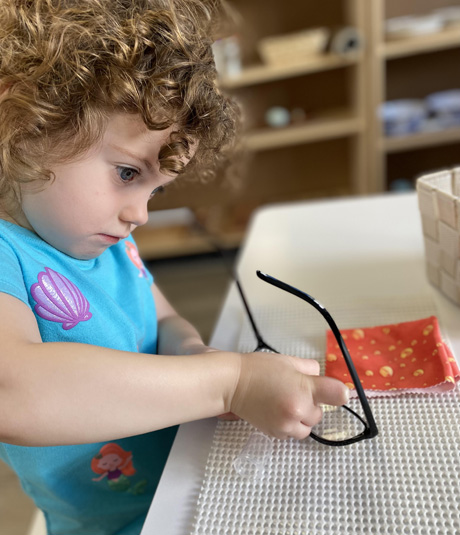Montessori in a Nutshell
Montessori education prioritizes the needs of the child; it is an approach as unique as your child themselves.
From individualized lesson plans that allow the child to work at his/her own pace, to a carefully prepared environment that helps the child to reach their fullest potential, Montessori education inspires within the child a love of learning while guiding them into becoming successful adults.
What is Montessori?
Imagine you are a very active seven year old child who is forced to sit at a desk all day. It sometimes takes you a little bit longer to grasp concepts and you start to feel anxious because your teacher is moving too quickly through the lesson. You don’t understand the concepts but you are too nervous and embarrassed to ask for help because all of your other classmates seem to understand.
On top of this, your teacher says that she will be giving you a test on this material in just two days. The pressure is building and you are becoming very discouraged...
This has been an experience of countless students in mainstream education time and time again.
The Montessori Classroom
We would like to welcome you to the Montessori classroom, where you (this same seven year old child) have the freedom to move around the environment (satisfying your inner need for movement), while choosing work that sparks your interest.
Your highly qualified Montessori trained teachers provide you with individualized lessons tailored to meet your unique needs, always meeting you where you are at.
You are never worried about comprehending a lesson/concept at the same time as your peers. You are at ease because you know that you can practice as much as you need in order to grasp what you are learning before moving on to a new concept.
It is based on scientific observations
The Montessori philosophy was founded by Dr. Maria Montessori over 100 years ago in Rome, Italy. This educational philosophy was born out of a combination of Montessori’s scientific observations and working experience (with children with varying abilities) which ultimately led her to create unique learning materials for young children. Over time, Dr. Montessori’s teaching methods and materials gained popularity and since then, have evolved into a world wide alternate approach to education.
Children as teachers, Adults as guides
Dr. Montessori felt strongly that children are very capable of teaching themselves and, through her many years of observations, found that they much prefer to carry out tasks independently of an adult. Independence, as Dr. Montessori stressed, is a key tenant of her approach -- it is the foundation for the child’s future success
“The education of even a small child, therefore, does not aim at preparing him for school, but for life”
- Dr. Maria Montessori, 1973
The Prepared Environment
Montessori’s unique philosophy features the “Prepared Environment”, which promotes independence and provides the child freedom (within limits) to choose the work that satisfies their inner needs to learn and grow in their surroundings. It is this environment (that is particularly suited to the child -- for example: child sized furniture) and the materials within it that spark the child’s interest in learning and helps them to develop their capabilities.
The materials in the “Prepared Environment” are unique to Montessori education, with each one isolating just one concept. The materials are real (used in everyday life), age appropriate and contain a control of error (i.e., are self-correcting), which allows the child to be their own teacher, reducing the need for adult instruction.
Within the Montessori curriculum there are 5 areas within the classroom:
- Practical Life
- Sensorial
- Language
- Arithmetic
- Culture

Citation: Raising Successful Adults (n.d.). Lifetime Montessori School.